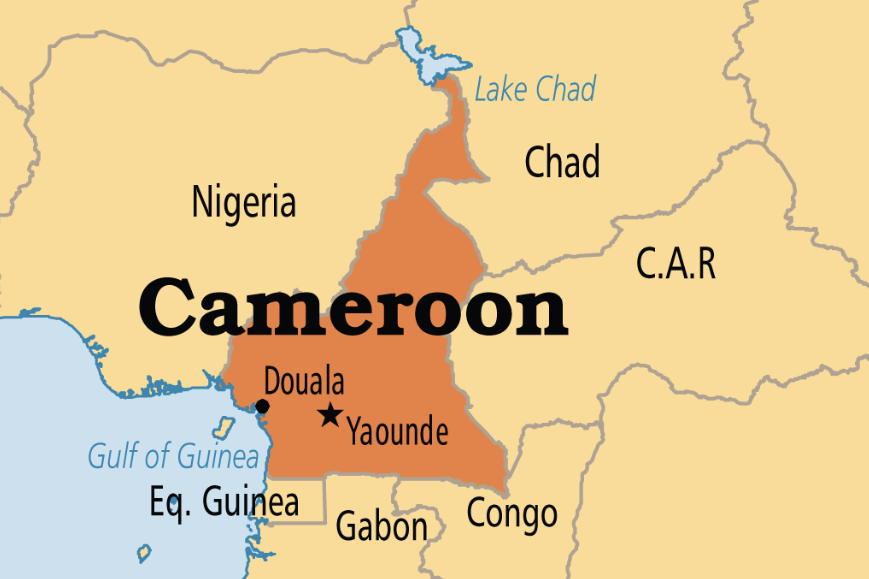But the company exporting the logs — Wood International Group — is part of a network of concerns in Africa operated by the Wagner Group, the notorious Russian private military enterprise. The United States placed Wood International Group under sanctions last September.
Wagner operates in the grey zone that spans legal and illegal economies. The group has deployed mercenaries to several African countries, typically in exchange for access to natural resources, including gold and diamonds. Wagner-linked companies have exploited these resources using illegal, corrupt and irregular means. For years, several of these businesses based in CAR have used Douala as a hub to import equipment and export goods such as timber.The logs exported by Wood International Group are not the only suspicious timber shipments to have passed through Douala. The port has long been a major thoroughfare for illicit timber felled in the forests of Cameroon and neighbouring countries.

Douala, Cameroon. (Graphic: Supplied by ISS Today)
A recent investigation by the Pulitzer Center found that despite Cameroon’s efforts to combat illegal logging, there has been a ‘troubling increase’ in cases. Often, the illegally felled timber is laundered through legal logging companies. They operate sawmills and warehouses close to Cameroon’s major ports, Douala and Kribi. The top destination countries are China and Vietnam.
Official data can indicate the scale of this kind of illicit trade. Comtrade, the United Nations database on world imports and exports, has statistics on timber imports from Cameroon declared by China and Vietnam, and what is declared as exports to these countries by Cameroon. Analysis of these two data groups between 2013 and 2018 (the latest figures that allow comparison) shows a gap of $1.099-billion — suggesting a large volume of undeclared or illegal trade.
Douala is the main seaport and economic capital of Cameroon. It manages just under 85% of the country’s international trade (according to port authority estimates). The city is a hub for global trade from Cameroon and its neighbours, including the landlocked CAR and Chad. So it’s not surprising that criminal networks use the port as a transit route and gateway between West and Central Africa and international markets.
The exploitation of transport hubs, particularly ports, by criminal networks is a universal problem. Seaports carry the vast majority of global trade —both licit and illicit. Over 80% of the international goods trade is carried by sea, according to 2021 data from the United Nations Conference on Trade and Development. This percentage is even higher for most developing countries.
Whether for fuel, grain or consumer goods, any major international supply chain relies on maritime trade. Port facilities are also a target for infiltration by criminal networks seeking access to global markets. This has been observed in Cameroon and globally.
The major ports of Antwerp and Rotterdam accounted for almost 65% of the cocaine seized in all European Union (EU) ports in 2020. A 2023 analysis by the EU Agency for Law Enforcement Cooperation (Europol) found that “ports are also exploited for moving shipments of illegal goods into the EU and are vulnerable to infiltration by criminal networks”. Europol said the sheer volume of containers transported each year made detecting illicit goods challenging.
In 2022, the Global Initiative Against Transnational Organized Crime (GI-TOC) mapped hotspots of illicit economies and violent conflict across West Africa. It developed the Illicit Economies and Instability Monitor to assess the role of these economies in fuelling instability. In all, 280 hubs were identified across 18 countries in West Africa.
The monitor confirmed that in the region, “transport infrastructure, such as seaports and airports, are key nodes in regional and global illicit economies”. Several coastal hubs, including Douala and other Cameroonian ports, were classified as ‘high risk’ for illicit and criminal activity.
In recent years, security reforms have improved oversight of goods in the Port of Douala and have brought port management in line with international standards. However, GI-TOC’s forthcoming research on the port found that vulnerabilities endure, and physical security improvements may be undermined by corruption.
Poor working conditions — in the port itself and its transport infrastructure — make staff vulnerable to recruitment and exploitation by criminal networks. These working conditions also create a high risk of accidents and injuries for port employees.
Douala shows the importance of strengthening the human side of port management. In conjunction with technical and physical improvements to port security, improving accountability and working conditions are essential. The same lessons could be applied to other ports and infrastructure in Africa that face similar exploitation by organised criminals.
Cameroon’s Douala Port: Organized Crime’s Access Point To Illicit Global Markets
March 11th, 2024
March 11th, 2024
Via Daily Maverick, an article on Cameroon’s Douala port keeps organised crime afloat through massive access to illicit global markets
In May 2023, a customs official in Douala, Cameroon stamped a shipment of timber for export from the Central African Republic (CAR) to China. It seemed like a routine load, an everyday part of international trade.
This entry was posted on Monday, March 11th, 2024 at 10:05 pm and is filed under Cameroon. You can follow any responses to this entry through the RSS 2.0 feed.
Both comments and pings are currently closed.
ABOUT
Focusing primarily on The New Seven Sisters - the largely state owned petroleum companies from the emerging world that have become key players in the oil & gas industry as identified by Carola Hoyos, Chief Energy Correspondent for The Financial Times - but spanning other nascent opportunities around the globe that may hold potential in the years ahead, Wildcats & Black Sheep is a place for the adventurous to contemplate & evaluate the emerging markets of tomorrow.
